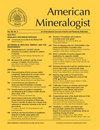Acceptance of the Distinguished Public Service Award of the Mineralogical Society of America for 2024
IF 2.3
3区 地球科学
Q2 GEOCHEMISTRY & GEOPHYSICS
引用次数: 0
Abstract
Mr. President, Colleagues and Friends,I am deeply honored to receive MSA’s Distinguished Public Service Medal. I was completely surprised when I received the email, and my first thought was that there must be some mistake. Being included among such an amazing group of people, including Rod Ewing, Dave Mogk, and Alex Speer, is incredible. I want to express my sincerest thanks to MSA and also to Jon Arthur, my citationist.The reason that I was so convinced that there must be a mistake is because I am not a mineralogist. The focus of my career has been geoscience information in general. It is true that I have worked on some projects that had a focus on mineralogy — for example, with the assistance of Alex Speer, ensuring that all the valid mineral names were included in the most recent edition of the Glossary of Geology, assisting with a project to track down all of the early volumes of American Mineralogist and adding references to all of the articles to GeoRef and, in the early days of my career, briefly editing the weekly seldom-read Minerals Exploration Alert—but these did not seem to qualify as sufficient service to mineralogy. It turns out that for the purpose of this award, MSA wisely chose to define mineralogy very broadly and to include service to national and international geoscience societies. So my long career at the American Geosciences Institute, AGI, seems to fit.A few years ago at a staff retreat, a facilitator asked us to choose the breakfast cereal that best described our thoughts regarding our roles at AGI. This type of exercise usually leaves me floundering for a sensible answer, but this time it was easy – LUCKY CHARMS. I have been extremely lucky and have lived a charmed life that has allowed me to combine my passion for information with the geological sciences.My interest in improving information dissemination started when I was an undergraduate, and I began working on my first research paper. Mystified by the tools provided in the library, I sought help from the reference librarian only to be told that she did not have sufficient expertise in my subject area to provide guidance. The idea that the user needed tools directly accessible to them that they could manipulate themselves started from that moment and has guided much of my career.As luck would have it, I wound up in the perfect place to pursue this passion. AGI was founded to engage in activities that benefit the geological discipline as a whole. The idea of digital information discovery was just beginning to be explored when I joined AGI, and I was lucky to be a part of the initial development of GeoRef.In addition to GeoRef, I was lucky enough to participate in two other projects that stand out as examples of impactful community-based information projects: the revision of the Glossary of Geology and the establishment of the publishing aggregate, GeoScienceWorld. The first project, the revision of the Glossary of Geology is a major undertaking. The 30,000 plus terms that are defined in the Glossary are all vetted by multiple experts within each field. And all of these experts volunteer their valuable time! A revision can require finding up to 120 individual geoscientists. But the end result is a collection of definitions that are used by professional geoscientists, students, and even the legal community. This is an amazing example of a community-based project with real impact. The second project, GeoScienceWorld, is an outstanding example of geoscience societies working together for the good of the community. Being a member of the original committee that worked toward launching GeoScienceWorld was one of the highlights of my career.Recently, I served as AGI’s Interim Executive Director during a time of financial issues and pandemic lockdowns. This gave me an even wider perspective on the contribution of geoscience to the wider scientific community and society. Like many of you, I have been testing out the new AI tools, and I recently asked ChatGPT to define the role of geoscience in society. I highly recommend that every geoscientist should give this a try. Within seconds, I was given a 10-point description that highlighted climate change, sustainability, natural resource utilization, clean water, and natural disasters as areas of expertise for the geosciences in society.In closing, I would like to thank the many, many geoscientists that it has been my honor to work with. And I sincerely thank MSA and Jon Arthur, my citationist, for this opportunity to consider my Lucky and Charmed career.接受美国矿物学会 2024 年度杰出公共服务奖
主席先生,各位同事和朋友们,我对获得 MSA 杰出公共服务奖章深感荣幸。当我收到这封电子邮件时,我感到非常惊讶,我的第一个念头是这一定是搞错了。能与包括罗德-尤因(Rod Ewing)、戴夫-莫克(Dave Mogk)和亚历克斯-斯皮尔(Alex Speer)在内的这么一群了不起的人同台竞技,真是不可思议。我想对 MSA 以及我的引文作者乔恩-阿瑟(Jon Arthur)表达我最诚挚的谢意。我职业生涯的重点是一般的地球科学信息。诚然,我曾参与过一些以矿物学为重点的项目--例如,在亚历克斯-斯皮尔(Alex Speer)的协助下,确保所有有效的矿物名称都被收录到最新版的《地质学词汇》中;协助开展一个项目,追寻《美国矿物学家》的所有早期卷册,并将所有文章的参考文献添加到 GeoRef 中;在我职业生涯的早期,曾短暂编辑过很少有人阅读的《矿物勘探快讯》周刊--但这些似乎都不足以算作对矿物学的贡献。事实证明,为了设立这个奖项,美国地质学家协会明智地选择了非常宽泛的矿物学定义,并将为国家和国际地球科学学会提供的服务包括在内。因此,我在美国地球科学研究所(AGI)的长期职业生涯似乎与此相吻合。几年前,在一次员工务虚会上,一位主持人让我们选择一种最能描述我们对自己在 AGI 所扮演角色的看法的早餐麦片。这类问题通常会让我不知如何回答,但这次我很容易就回答了--幸运麦片。我非常幸运,幸运的生活让我能够将对信息的热情与地质科学结合起来。我对改进信息传播的兴趣始于本科时期,我开始撰写第一篇研究论文。我对图书馆提供的工具感到困惑,于是向参考资料馆员寻求帮助,却被告知她在我的学科领域没有足够的专业知识来提供指导。从那时起,我就萌生了一个想法:用户需要可以直接使用的工具,他们可以自己操作这些工具。成立 AGI 的初衷是从事有益于整个地质学科的活动。在我加入 AGI 时,数字信息发现的理念才刚刚开始探索,而我有幸参与了 GeoRef 的初步开发。除了 GeoRef 之外,我还有幸参与了另外两个项目,这两个项目都是以社区为基础的信息项目的杰出代表:《地质学词汇》的修订和出版总库 GeoScienceWorld 的建立。第一个项目是修订《地质学词汇》,这是一项重大工程。术语表》中定义的 30,000 多个术语均由各个领域的多位专家审核。所有这些专家都自愿付出宝贵的时间!一次修订可能需要找到多达 120 位地质科学家。但最终的结果是,专业地球科学家、学生甚至法律界都在使用这些定义。这是一个以社区为基础、具有真正影响力的项目的绝佳范例。第二个项目 "GeoScienceWorld "是地球科学学会为社区利益共同努力的杰出范例。最近,我在财务问题和大流行病封锁期间担任了 AGI 的临时执行董事。这使我对地球科学对更广泛的科学界和社会的贡献有了更广阔的视野。和你们中的许多人一样,我一直在测试新的人工智能工具,最近我请 ChatGPT 定义地球科学在社会中的作用。我强烈建议每位地球科学家都试一试。几秒钟之内,我就得到了一份 10 点描述,其中强调了气候变化、可持续发展、自然资源利用、洁净水和自然灾害是地球科学在社会中的专业领域。我还要衷心感谢 MSA 和我的引荐人乔恩-阿瑟(Jon Arthur),感谢他们给我这次机会来考虑我的幸运和迷人的职业生涯。
本文章由计算机程序翻译,如有差异,请以英文原文为准。
求助全文
约1分钟内获得全文
求助全文
来源期刊

American Mineralogist
地学-地球化学与地球物理
CiteScore
5.20
自引率
9.70%
发文量
276
审稿时长
1 months
期刊介绍:
American Mineralogist: Journal of Earth and Planetary Materials (Am Min), is the flagship journal of the Mineralogical Society of America (MSA), continuously published since 1916. Am Min is home to some of the most important advances in the Earth Sciences. Our mission is a continuance of this heritage: to provide readers with reports on original scientific research, both fundamental and applied, with far reaching implications and far ranging appeal. Topics of interest cover all aspects of planetary evolution, and biological and atmospheric processes mediated by solid-state phenomena. These include, but are not limited to, mineralogy and crystallography, high- and low-temperature geochemistry, petrology, geofluids, bio-geochemistry, bio-mineralogy, synthetic materials of relevance to the Earth and planetary sciences, and breakthroughs in analytical methods of any of the aforementioned.
 求助内容:
求助内容: 应助结果提醒方式:
应助结果提醒方式:


